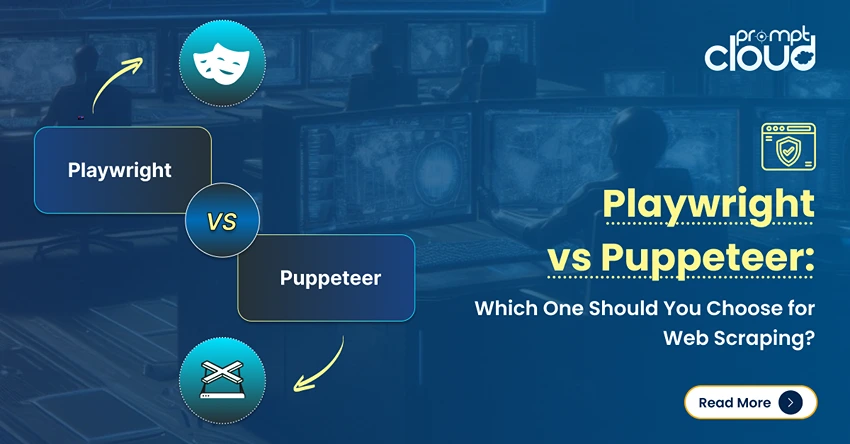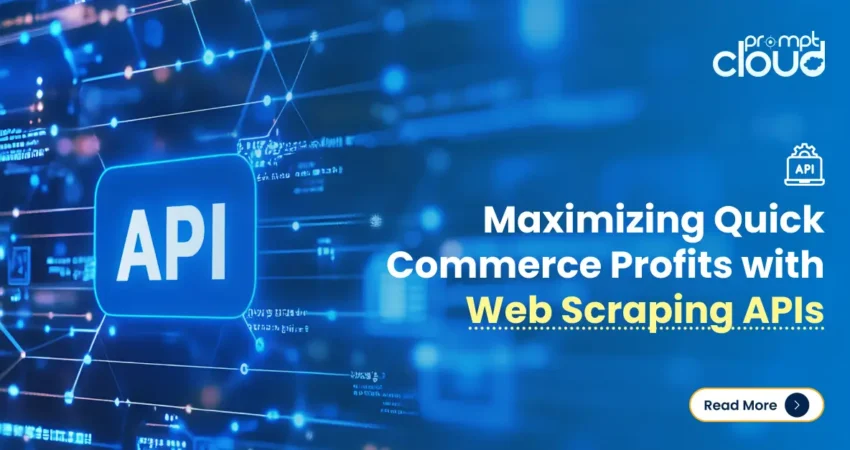
Q-Commerce, or quick commerce, is revolutionizing shopping by offering delivery services that greatly exceed expectations, guaranteeing delivery within minutes. This style of shopping is seen as competitive due to its ease of access as opposed to traditional e-commerce where users schedule the delivery of their purchases.
In such a fiercely competitive landscape, businesses adopting fast-paced delivery models need to be proactive by sensing consumer needs, redefining pricing strategies, and improving supply chain efficiencies.
Getting data through scraping APIs has become a vital aspect of business operations as it allows merchants to analyze marketplace data real-time for pricing, competition, and customer analysis. In this article, we analyze the approach to rapid commerce profitability by employing scraping APIs.
What is Quick Commerce?
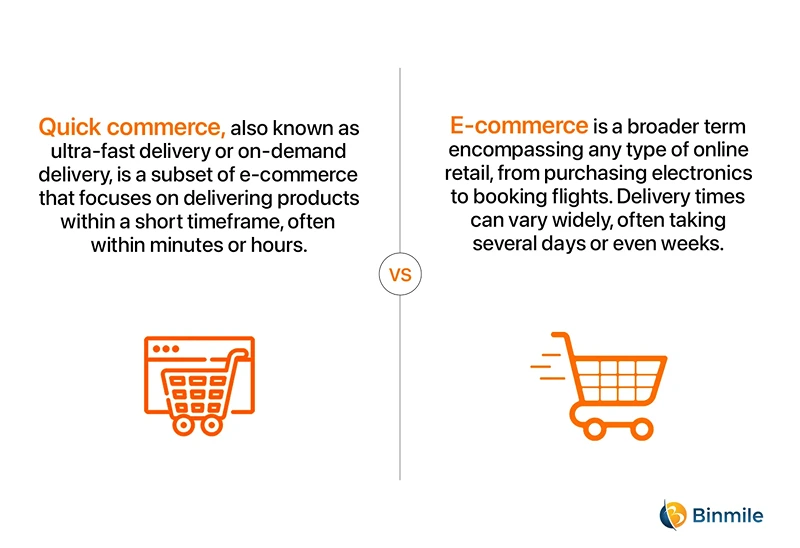
Image Source: Binmile
Q-commerce or quick commerce refers to modernized e-commerce services that guarantee fast delivery of mundane items, groceries, and other necessities. The term stands in contrast to e-commerce stores that take days to fulfill an order.
Quick commerce offers the promise of obtaining products delivered to the customer’s doorsteps in a matter of minutes or hours due to nearby fulfillment centers that are strategically positioned alongside advanced logistical transport systems.
Quick Commerce vs. E-commerce: The Key Differences
| Feature | Quick Commerce | E-commerce |
| Delivery Time | Minutes to hours | Days to weeks |
| Product Range | Essentials, groceries, daily needs | Wide variety, including non-essentials |
| Inventory | Micro-warehouses near customers | Large warehouses, often far from cities |
| Order Size | Small & Frequent | Larger, less frequent |
| Technology Use | Real-time analytics, AI, web scraping | Predictive analytics, traditional inventory management |
As global and Indian markets adopt Q-commerce, there is an evident need for companies to have advanced tools such as web scraping APIs to retain their competitive edge.
Why Quick Commerce Companies Need Web Scraping APIs?
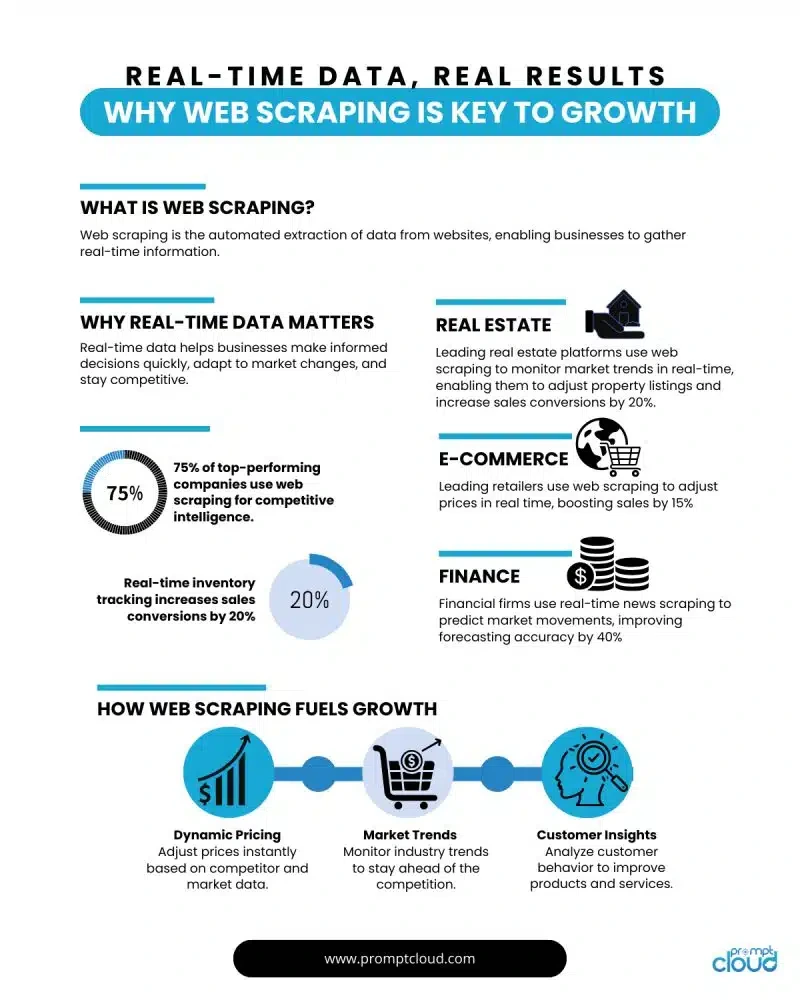
Operating in a rapidly changing environment means that quick commerce operators need to keep evaluating competitors, adjusting prices, and improving supply chain management. Access to market data through web scraping APIs enables real-time responsive business decision-making. Some of the generic areas of value add include:
- Competitive price tracking – Adjusting pricing strategies in response to competitors’ pricing.
- Demand forecasting – Studying the direction of consumer spending to project product consumption.
- Inventory management – Maintaining stock levels based on current data.
- Customer sentiment analysis – Monitoring online comments to improve products by tracking online reviews.
The adoption of web scraping APIs would greatly assist quick commerce companies in gaining an edge over the competition.
How Web Scraping APIs Help Maximize Quick Commerce Profits?
1. Competitive Price Monitoring
Quick commerce relies heavily on price for a low-margin and high-volume sector. Web scraping APIs provide businesses with the ability to track multiple competitor prices in real-time so that they can quickly adjust prices if necessary.
As an illustration, a quick commerce firm operating in India can scan grocery prices in Blinkit, Zepto, and Instamart through web scraping. This information is useful to establish price levels that are competitively attractive while yielding profits.
2. Demand Forecasting and Inventory Optimization
Quick commerce businesses need to make certain that the appropriate products are present when there is a need. Web scraping APIs provide solutions to estimate demand by studying the preferences of people, search patterns as well as seasonal changes.
For instance, if the data shows that there is higher demand for cold drinks during summer, the firm can capture that by storing more in micro-fulfillment centers. This method reduces the likelihood of running out of stock and improves customer satisfaction.
3. Real-Time Market Intelligence
Competitor marketing moves, new product introductions, or customer comment tracking are vital for quick commerce. It is important to gather information from competitors’ sites, social media, marketplaces and many other channels. Web scraping APIs allow for this type of collection.
Using the data gleaned from those places, companies can develop competitive strategies like implementing quick sales or selling popular products to satisfy high demand.
4. Supply Chain Optimization and Waste Reduction
Since quick commerce deals with goods that can perish, it only makes sense why supply chain management is extremely important. Web scraping APIs enable businesses to monitor supplier price changes over time, control stock levels, and enhance the logistics of last-mile delivery.
For example, a grocery-oriented quick commerce software can deploy web scraping APIs to track the wholesale price of vegetables from various suppliers. This enables them to buy products from vendors that offer the best prices, leading to lower procurement expenditures and waste.
Best Practices for Integrating Web Scraping APIs in Quick Commerce
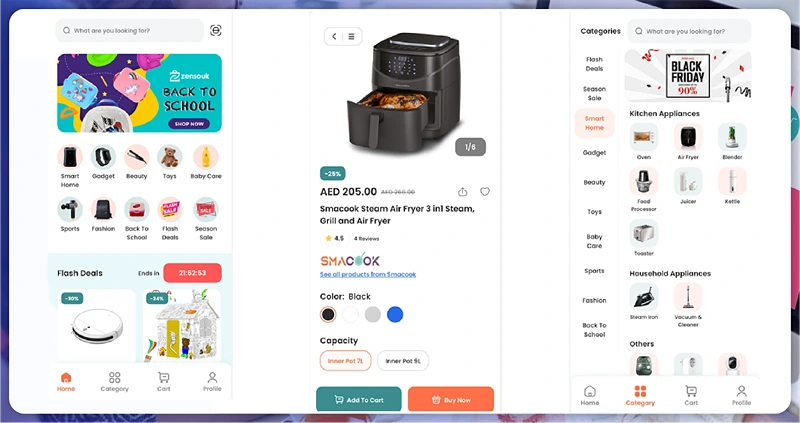
Image Source: FoodDataScrape
1. Define Data Requirements
Implementing Web Scraping APIs on quick commerce websites begins by understanding what information needs to be optimized. Quick commerce companies may want to monitor the prices of other competitors, their products, and the market demand and customer sentiment.
To guarantee relevant and useful information is captured, data needs have to be clearly articulated. A grocery delivery service, for example, could scrape pricing data, while pharmacy-based e-commerce could track seasonal sales of medicine and wellness products.
2. Choose a Reliable Web Scraping API
Getting the appropriate API is crucial in getting the correct and current information. A dependable web scraping API should be proficient in bulk data extraction and should provide frequent updates. Businesses also need to make sure that the API does not breach any legal or ethical standards concerning data collection and the consequences that follow.
Working with a provider who has flexible solutions improves the reliability and relevancy of the information gathered. As a result, these providers enable quick commerce companies to concentrate on getting the most insightful pieces of information without the burden of worthless data.
3. Automate Data Collection and Analysis
The subsequent step after API integration for quick commerce businesses is automating the data-gathering process. Companies no longer have to manually gather and analyze data, they can create automated systems which will monitor and refresh the data in real-time.
Automation makes it easy for any organization to take advantage of market trends by swiftly responding to drastic price changes, stock movements, and new customer buying behaviors. Information gathered as a result of automation can be directly inserted into pricing structures, inventory databases, or marketing systems, thus making it easier to make more solid decisions.
4. Optimize Operations Based on Insights
Web scraping APIs are designed to analyze captured data and help businesses make decisions that will lead to value creation. After the data has been harvested and analyzed, companies need to utilize the obtained insights to enhance different parts of their processes.
Competitor price tracking data can be very useful; if quick commerce platforms identify that competitors dropped the prices on certain products, they know to adjust their pricing models accordingly.
If a business sees that demand forecasting shows that there will be a spike in demand for a certain product, then they can purchase enough stock in advance so that they do not run out of supply. By utilizing insights in this way, quick commerce operators are able to improve customer satisfaction levels, minimize waste, and increase profits.








